
 |
Far From Heaven (2002) Directed by Todd Haynes Cast: Julianne Moore, Dennis Quaid, Dennis Haysbert, Patricia Clarkson, Viola Davis, Ryan Ward, Lindsay Andretta, Jordan Puryear, Celia Weston, James Rebhorn, Betty Henritze, Michael Gaston 2002 – 107 minutes Rated: Reviewed by Dustin Putman, November 17, 2002. 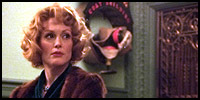 A brave cinematic experiment that pays off handsomely, "Far From Heaven," written and directed by Todd Haynes (1998's "Velvet Goldmine"), is not only set in Hartford, Connecticut, circa 1957, but emulates the style in which '50s melodramas were made. In doing so, the dialogue is often representative of the movies and sitcoms that were made during this era ("Aw schucks" is used by children, for example, when they don't get what they want), and the vibrant autumn hues and deep shadows that litter each frame remind one of the glorious Technicolor cinematography used in this decade. Not stopping there, Haynes also uses a huge, cursive font for the opening title card, and end credits placed over a colorful painted background.
A brave cinematic experiment that pays off handsomely, "Far From Heaven," written and directed by Todd Haynes (1998's "Velvet Goldmine"), is not only set in Hartford, Connecticut, circa 1957, but emulates the style in which '50s melodramas were made. In doing so, the dialogue is often representative of the movies and sitcoms that were made during this era ("Aw schucks" is used by children, for example, when they don't get what they want), and the vibrant autumn hues and deep shadows that litter each frame remind one of the glorious Technicolor cinematography used in this decade. Not stopping there, Haynes also uses a huge, cursive font for the opening title card, and end credits placed over a colorful painted background.
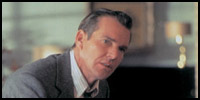 Were Haynes to have stopped there and simply made nothing more than an artificial '50s motion picture, the results would likely be viewed as cornball and stilted. What he ultimately has done is far more intriguing. Haynes introduces the characters to such taboo subject matter of the time as homosexuality and racism, and then forces them to react to this material even though they do not know, and are far from accustomed to, how to deal with it. The outcome is something intentionally outdated, surprisingly modern, and never less than thought-provoking.
Were Haynes to have stopped there and simply made nothing more than an artificial '50s motion picture, the results would likely be viewed as cornball and stilted. What he ultimately has done is far more intriguing. Haynes introduces the characters to such taboo subject matter of the time as homosexuality and racism, and then forces them to react to this material even though they do not know, and are far from accustomed to, how to deal with it. The outcome is something intentionally outdated, surprisingly modern, and never less than thought-provoking.
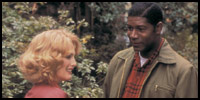 Cathy Whitaker (Julianne Moore) is a joyful housewife fully at peace with her comfortable married lifestyle, complete with two young children and a spacious home with a white picket fence out front. Her entire world shifts one night when she decides to personally take dinner to the office of her hard-working husband, Frank (Dennis Quaid), and catches him kissing another man. Frank admits that he has had "these feelings" for as long as he can remember, but is willing to see a psychiatrist in an attempt to change.
Cathy Whitaker (Julianne Moore) is a joyful housewife fully at peace with her comfortable married lifestyle, complete with two young children and a spacious home with a white picket fence out front. Her entire world shifts one night when she decides to personally take dinner to the office of her hard-working husband, Frank (Dennis Quaid), and catches him kissing another man. Frank admits that he has had "these feelings" for as long as he can remember, but is willing to see a psychiatrist in an attempt to change.
Meanwhile, Cathy finds herself becoming an outcast to her friends and community when she starts a friendship with her polite, soft-spoken black gardener, Raymond Deagan (Dennis Haysbert). In a time when races were supposed to stick to their "own kind," Cathy's harmless behavior sparks nasty rumors and is viewed as unacceptable and potentially dangerous. 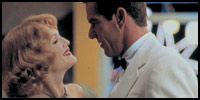 In tone and appearance, "Far From Heaven" often feels as if it really was made in 1957. The slightly oversaturated, picture-perfect cinematography, by Edward Lachman (2002's "Simone"), is simply transcendental, conveying a superior richness in time and setting (the fall and winter seasons) that is remarkable to behold. The brown, orange, and red leaves that fall from the trees, for example, burst off the screen in a cornucopia of colors and textures. Even if "Far From Heaven" had failed on a storytelling level, which it does not, it would remain worth seeing simply as a visual marvel unsurpassed by any other movie this year.
In tone and appearance, "Far From Heaven" often feels as if it really was made in 1957. The slightly oversaturated, picture-perfect cinematography, by Edward Lachman (2002's "Simone"), is simply transcendental, conveying a superior richness in time and setting (the fall and winter seasons) that is remarkable to behold. The brown, orange, and red leaves that fall from the trees, for example, burst off the screen in a cornucopia of colors and textures. Even if "Far From Heaven" had failed on a storytelling level, which it does not, it would remain worth seeing simply as a visual marvel unsurpassed by any other movie this year.
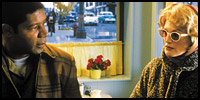 What significantly stands the film apart from a 1950's weepy is that the then-controversial themes would have been lightly skirted around fifty years ago, whereas Haynes faces them head-on today. The three central figures in the story—Cathy, Frank, and Raymond—certainly mean well, but their occasionally flawed actions are the results of the time in which they grew up, and are now still living in. Cathy stands by Frank even when she catches him cheating on her with a man, in an attempt to hide her knowledge from the community. She also advises Frank to do whatever is necessary to be cured of his affliction. Were Cathy to be a woman living in 2002, her views would expose her to be outrageously naive and ignorant; since she is a product of the '50s, she is only reacting in the manner she has been taught. When therapy does not alter Frank's attractions, he turns to booze and, briefly, spousal abuse. And Raymond, who longs to change the wide prejudices toward other races in the world, nonetheless is able to understand and face up to why he and Cathy could never truly be friends.
What significantly stands the film apart from a 1950's weepy is that the then-controversial themes would have been lightly skirted around fifty years ago, whereas Haynes faces them head-on today. The three central figures in the story—Cathy, Frank, and Raymond—certainly mean well, but their occasionally flawed actions are the results of the time in which they grew up, and are now still living in. Cathy stands by Frank even when she catches him cheating on her with a man, in an attempt to hide her knowledge from the community. She also advises Frank to do whatever is necessary to be cured of his affliction. Were Cathy to be a woman living in 2002, her views would expose her to be outrageously naive and ignorant; since she is a product of the '50s, she is only reacting in the manner she has been taught. When therapy does not alter Frank's attractions, he turns to booze and, briefly, spousal abuse. And Raymond, who longs to change the wide prejudices toward other races in the world, nonetheless is able to understand and face up to why he and Cathy could never truly be friends.
Julianne Moore (2001's "Hannibal") is simply luminous as Cathy Whitaker. It would be easy for an actor to take this kind of tricky material and go over-the-top with it, but Moore avoids such a trap to portray Cathy as an intelligent and realistic female with no comedic pretenses. Dennis Quaid (2002's "The Rookie") and Dennis Haysbert (TV's "24" and 1999's "Random Hearts") effectively underplay their roles of Frank and Raymond, providing strong support, but this is Moore's show all the way. 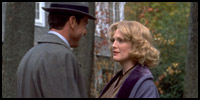 If the simultaneously retro/modern style of "Far From Heaven" is invigoratingly groundbreaking, director Todd Haynes' one crutch is his inability to make this once-tearjerking material a tearjerker for present-day audiences. The picture is poignant, to be sure, but the '50s movie-style blocks it from being the emotional powerhouse he so obviously has intended for it to be. No matter. Consistently beautiful to look at and thematically daring, "Far From Heaven" remains unlike any other film you are sure to see this year.
If the simultaneously retro/modern style of "Far From Heaven" is invigoratingly groundbreaking, director Todd Haynes' one crutch is his inability to make this once-tearjerking material a tearjerker for present-day audiences. The picture is poignant, to be sure, but the '50s movie-style blocks it from being the emotional powerhouse he so obviously has intended for it to be. No matter. Consistently beautiful to look at and thematically daring, "Far From Heaven" remains unlike any other film you are sure to see this year.
©2002 by Dustin Putman |
 |













